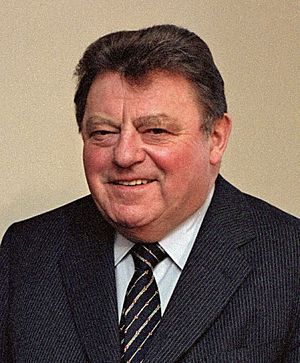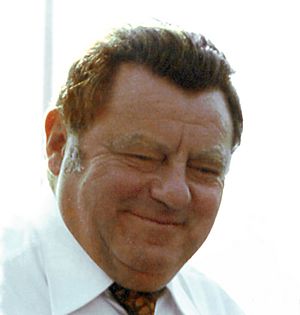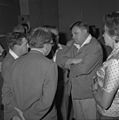Franz Josef Strauß facts for kids
Quick facts for kids
Franz Josef Strauß
|
|
|---|---|

Strauß in 1982
|
|
| Minister-President of Bavaria | |
| In office 6 November 1978 – 3 October 1988 |
|
| Preceded by | Alfons Goppel |
| Succeeded by | Max Streibl |
| Federal Minister of Finance | |
| In office 2 December 1966 – 22 October 1969 |
|
| Preceded by | Kurt Schmücker |
| Succeeded by | Alex Möller |
| Federal Minister of Defence | |
| In office 16 October 1956 – 16 December 1962 |
|
| Preceded by | Theodor Blank |
| Succeeded by | Kai-Uwe von Hassel |
| Federal Minister for Atomic Affairs | |
| In office 21 October 1955 – 16 October 1956 |
|
| Succeeded by | Siegfried Balke |
| Federal Minister for Special Affairs | |
| In office 1953–1955 |
|
| Personal details | |
| Born | 6 September 1915 Munich |
| Died | 3 October 1988 (aged 73) Regensburg |
| Nationality | German |
| Political party | CSU |
| Spouse | Marianne Zwicknagl |
| Children | Max Josef Franz Georg Monika |
| Signature |  |
Franz Josef Strauß (born September 6, 1915 – died October 3, 1988) was an important German politician. He was a member of the CSU party. He served as the Minister-President (like a state governor) of the German state of Bavaria. People sometimes called him the "Strong Man of Europe" because of his influence.
Franz Josef Strauß: A German Politician
Early Life and Education
Franz Josef Strauß was born in Munich, Germany. His father was a butcher. He studied at the University of Munich from 1935 to 1939. During his studies, he had to join the NSDStB (National Socialist German Students' League). This was a rule for all students at that time.
Military Service in World War II
During World War II, Strauß served in the German army. He fought on both the Western and Eastern Fronts. In late 1942, he got severe frostbite on the Eastern Front. Because of this injury, he became a political officer at an anti-aircraft artillery school. After the war, he changed his name to Franz Josef Strauß.
Family Life
In 1957, Strauß married Marianne Zwicknagl. They had three children: Max Josef, Franz Georg, and Monika. His daughter, Monika, also became a politician in Bavaria.
Starting a Political Career
After World War II, the American army appointed Strauß as a local leader in Schongau. He helped create the local branch of the CSU party there. This was the start of his long political journey.
Becoming a Federal Minister
In 1949, Strauß became a member of the first Bundestag (Germany's federal parliament). He quickly rose through the ranks. In 1953, he became the Federal Minister for Special Affairs. Later, in 1955, he was appointed Federal Minister of Nuclear Energy. In 1956, he became the defence minister. As defence minister, he played a key role in building up the new German army, called the Bundeswehr. He became the leader of the CSU party in 1961.
Role as Finance Minister
In 1966, Strauß became the Minister of Finance. He worked with Karl Schiller, who was the economy minister from the SPD. However, in 1969, the SPD formed a government without the CDU/CSU. Strauß then lost his job as finance minister. He often criticized the new government's foreign policy, known as Ostpolitik.
Running for Chancellor
In 1976, there was a disagreement between the CDU and CSU parties. Strauß ended their alliance in the Bundestag for a short time. He only restarted it when the CDU threatened to expand their party into Bavaria.
In the 1980 federal election, Strauß ran as the candidate for Chancellor for the CDU/CSU parties. Some people believed this showed that the CDU and CSU leaders thought he was the best choice. Others thought it was a difficult election to win, and they had nothing to lose by letting Strauß run.
Leading Bavaria
From 1978 until his death in 1988, Strauß served as the Minister-President of Bavaria. He also served as the President of the Bundesrat (a council of German states) in 1983-1984. Even after leaving federal politics, he continued to share his opinions on national issues from Bavaria. He often disagreed with Chancellor Helmut Kohl.
Loan to East Germany
In 1983, Strauß helped arrange a large loan of 3 billion Deutschmarks for East Germany. This decision was not popular with everyone.
Rare Visit to Albania
On August 21, 1984, Strauß visited communist Albania. At that time, Albania was a very closed country, ruled by a strict dictator named Enver Hoxha. Strauß was one of the few Western leaders to visit Albania in many decades. Some people thought this visit might help start diplomatic talks between Albania and West Germany, but nothing major came from it.
Death
On October 1, 1988, Franz Josef Strauß collapsed while hunting near Regensburg. He died in a hospital in Regensburg on October 3, without waking up.
Legacy and Impact
Franz Josef Strauß was a very important figure in Germany after World War II. He was known for his strong opinions and powerful speeches. He was a conservative leader who often made people with different political views angry.
Strauß helped change Bavaria from a mostly farming state into a modern center for technology in Germany. He was very interested in aerospace and supported the development of the Airbus in the 1970s. Because of his contributions, the new Munich Airport was named the Franz Josef Strauß International Airport in 1992.
| Preceded by Theodor Blank |
Minister of Defence 1956 – 1963 |
Succeeded by Kai-Uwe von Hassel |
| Preceded by Alfons Goppel |
Minister-President of Bavaria 1978 – 1988 |
Succeeded by Max Streibl |
Images for kids
See also
 In Spanish: Franz Josef Strauß para niños
In Spanish: Franz Josef Strauß para niños
 | Lonnie Johnson |
 | Granville Woods |
 | Lewis Howard Latimer |
 | James West |





